高二英语外研版选修六教学案:Module 6 Section 2 含答案(精修版)
高二英语外研选修六活练习:Modle Mic period two 含答案

Period Two Vocabulary and ReadingⅠ.根据课文Street Music,判断正(T)误(F)1.No one is willing to pay for the street music.(F)2.The man mentioned in Para.2 made a living by playing music.(F)3.Most people stop and listen as the music man plays his organ in Paris.(F)4.The street music plays an important part in keeping alive a culture disappearing in our lives.(T) 5.Recorded music loses some of its liveliness compared to street music.(T)6.The author holds a positive attitude to the street music.(T)Ⅱ.根据汉语提示拼写单词1.The drugs became widely used on the streets,leading to strict federal laws regulating (规定) their use.2.The sweater my mother bought for me as a present had shrunk_(变小) after repeated washing. 3.One evening,a passerby(过路人) asked to stay for the night.4.He was lying in the sun,looking very relaxed (放松) and happy.5.Building that railway was very difficult and involved digging ten tunnels (隧道).6.It is a great relief (安慰) to have rain after a long time of drought.Ⅲ.完成句子1.To_our_relief (令我们欣慰的是),children all arrived home safely.2.We were driving along,when all_of_a_sudden/suddenly (突然) a car pulled straight out in front of us.3.Hearing that he had passed the exam,he sighed in_relief(松了口气).4.We shall not need any more for_the_present(暂时).5.They danced_to_the_music(随着音乐跳舞) of a string quartet.Ⅳ.单项填空1.Since everyone would like to find an apartment near the school,there are very few ________ apartments in the area.A.free B.vacantC.empty D.reserved答案 B解析vacant(指房屋)无人占用的,空的,符合句意。
高二英语外研版选修六教学案:Module 6 Section 2 含答案
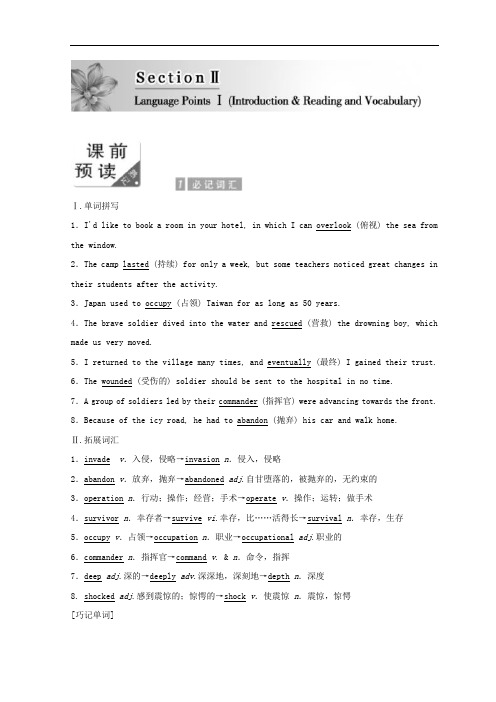
Ⅰ.单词拼写1.I'd like to book a room in your hotel, in which I can overlook (俯视) the sea from the window.2.The camp lasted (持续) for only a week, but some teachers noticed great changes in their students after the activity.3.Japan used to occupy (占领) Taiwan for as long as 50 years.4.The brave soldier dived into the water and rescued (营救) the drowning boy, which made us very moved.5.I returned to the village many times, and eventually (最终) I gained their trust. 6.The wounded (受伤的) soldier should be sent to the hospital in no time.7.A group of soldiers led by their commander (指挥官) were advancing towards the front. 8.Because of the icy road, he had to abandon (抛弃) his car and walk home.Ⅱ.拓展词汇1.invade v.入侵,侵略→invasion n.侵入,侵略2.abandon v.放弃,抛弃→abandoned adj.自甘堕落的,被抛弃的,无约束的3.operation n.行动;操作;经营;手术→operate v.操作;运转;做手术4.survivor n.幸存者→survive vi.幸存,比……活得长→survival n.幸存,生存5.occupy v.占领→occupation n.职业→occupational adj.职业的6.commander n.指挥官→command v. & n.命令,指挥7.deep adj.深的→deeply adv.深深地,深刻地→depth n.深度8. shocked adj.感到震惊的;惊愕的→shock v.使震惊n.震惊,惊愕[巧记单词]词根词形变化构词点拨command commander 动词加er构成副词operate operation 动词去e加(t)ion构成名词Ⅲ.补全短语1. at the same time 同时2.take place 发生3. at one point 一度,在某一时刻4.declare war on 对……宣战5.take part in 参加6.get off 下车/船/飞机7.make a breakthrough 取得重大突破(进展)8.pick up 停下来让某人搭车(船等);救起9.as a result 结果,因此10.be situated on 位于,坐落在1.[教材原句]The operation was extremely dangerous and many soldiers were killed before they even got off the boats.这次登陆行动异常危险,很多士兵还没来得及下船就牺牲了。
高中英语外研版选修6学案:Module 1-Section Ⅱ 含解析(精修版)
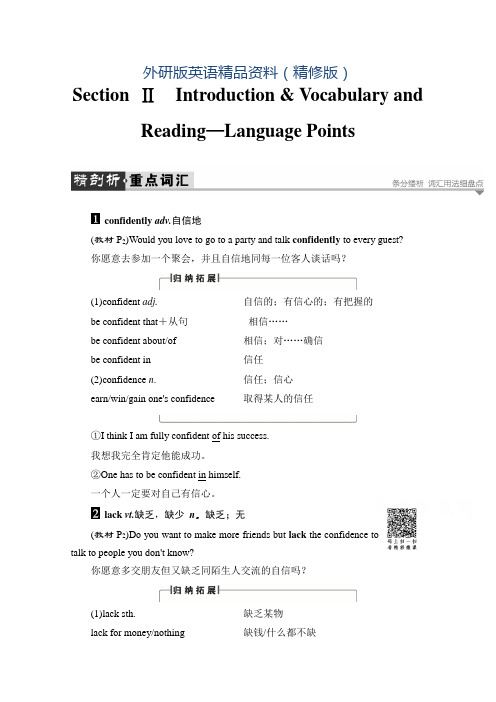
外研版英语精品资料(精修版)Section ⅡIntroduction & Vocabulary and Reading—Language Pointsconfidently adv.自信地(教材P2)Would you love to go to a party and talk confidently to every guest?你愿意去参加一个聚会,并且自信地同每一位客人谈话吗?(1)confident adj.自信的;有信心的;有把握的be confident that+从句相信……be confident about/of 相信;对……确信be confident in 信任(2)confidence n. 信任;信心earn/win/gain one's confidence 取得某人的信任①I think I am fully confident of his success.我想我完全肯定他能成功。
②One has to be confident in himself.一个人一定要对自己有信心。
lack vt.缺乏,缺少n.缺乏;无(教材P2)Do you want to make more friends but lack the confidence totalk to people you don't know?你愿意多交朋友但又缺乏同陌生人交流的自信吗?(1)lack sth. 缺乏某物lack for money/nothing 缺钱/什么都不缺(2)lack n. 缺少,缺乏the/a lack of... ……不足for lack of 因缺乏……(3)lacking adj.缺少的,缺乏的be lacking in 缺乏;没有①Lack of money is the root of all evil.缺乏金钱是万恶之源。
②He is lacking in responsibility.他缺乏责任心。
高二英语外研版选修六习题:课时卷六 含答案

Module 2 课下能力提升(六)Ⅰ.根据提示写出单词的正确形式1.To the pleasure of the children, a new park is to be built on the ________ (边缘) of the town.2.I thought it would rain, but the clouds have ________ (消失) and it's a fine day.3.It took her about ten years to complete the ________ (系列) of Harry Potter.4.People are trying more and more attention to body exercise to________ (塑造) the body.5.I have ________ (怀疑) about whether he is the best man for the job.6.All the students that work hard can ________ (definite) pass the exam.7.He drove away in the ________ (direct) of London.8.Many stars are ________ (visible) without a telescope.9.A young woman passing by saw the little boy and could read the ________ (long) in his pale blue eyes.10.Weak with ________ (exhaust), the climbers were finally lifted to safety.Ⅱ.选词填空reach out, come up to, turn away, look around for, keep one's eyes on, be laden with, put down, sweep over, hold out, stand still1.She ____________ when he was trying to kiss her.2.He gave a start of astonishment, and ____________.3.A tree____________its branches towards the light.4.Peter failed to find the geography book he needed though he had ____________ it.5.The girl is ____________ the moon, lost in thought.6.A hot wave of anger ____________ the America public because several violent attacks happened in the capital within a week.7.At the airport Mr Liu ____________ his hand, but the lady from Egypt refused to take it.8.Stopping discussing the matter.Let me____________ your cellphone number before I forget it.9.Three years later, the peace tree ____________ fruit, which surprised the children.10.When his books fell onto the ground, a passerby ____________help him pick them up.Ⅲ.完成句子1.有这么多人帮助我们,我们一定会成功的。
英语选修6外研Modle1—6作业2及答案

英语选修6外研版Module1—6作业(2)及答案一、单项选择(共小题,每小题分)1. Having a trip abroad is certainly good for the old couple, but it remains _____ whether they will enjoy it.A. to seeB. to be seenC. seeingD. seen2. The explanation of our teacher will make the reading easy ______.A. to be understandB. to understandC. understoodD. understanding3. Don’t forget to examine the test paper you have just finished_____the possible mistakes in it .A. correctingB. to correctC. and correctedD. having correcting4. Cleaning women in big cities usually get ____by the hour.A. payB. payingC. paidD. to pay5. The doctor persuaded the patient ____.Which statement is WRONG?A. not to smoke againB. to stop smokingC. to stop to smokeD. into stopping smoking6. Only when class began ______that he had left his book at home.A. will he realizeB. he did realizeC. did he realizeD. had he realized7. I wonder if your brother will go to the party. If he does, so ______mine.A. isB. doC. doesD. will8. So seriously that he had to stop playing in the football matchA. his feet were hurtB. were hurt his feetC. hurt were his feetD. were his feet hurt9. Some students are going to China in summer vacation, and ________.A. some are to AmericaB. some going to AmericaC. some to AmericaD. some America10. --We’d better hurry, or we’ll be late.---_______? Do you really want to listen to the boring lecture?A. For whatB. What ifC. If whatD. So what11. —Are there any English story-books for us students in the library?—There are only a few,______.A. if anyB. if haveC. if someD. if has12. “Well done, John! Not a single mistake _______ in your exam paper this time!” said theteacher.A.you made B.did you makeC.had you made D.have you made13. In front of the temple _______ which came here to be in search of the wanted person.A. several police cars wereB. were several police carsC. was several police carsD. several police cars was14. If Joe’s wife won’t go to the party, .A. he will eitherB. neither will heC. he neither willD. either he will15. Only ______ a human being.A.when is it hungry a lion will attackB.when it is hungry a lion will attackC.when it is hungry will a lion attackD.when is it hungry will a lion attack16. ---- What are you reading, Tom? ---- I’m not really reading, just __ the pages.A. turning offB. turning aroundC. turning overD. turning up17. The dictionary still _____ where I _____ it a moment ago.A. lies; laidB. lied; layC. laid; laidD. lies; lay18. I don’t know how he managed to _____ cheating in the exam.A. get away withB. get away fromC. get out ofD. get rid of19. We _____ the old scientist _____ his contribution _____ the country.A. admire; for; toB. admire; at; toC. respect; on; forD. respect; on; at20. — Do you know why the teacher asks for me?— He wants you to _____ your absence last night.A. set offB. settle downC. watch outD. account for二、完型填空(共小题,每小题分)21. 完形填空(共20小题;每题1分,共20分)September 4 was my first day at Phillips Academy, my new school. It was also my 18th birthday.I received a warm 36 from my host family--- the Steins. Gena was my host mum, and her daughter Lily would also be a new 37 at Phillips. They took me to the school and 38 me around the campus.On our way to my dorm, we saw a huge truck delivering a student’s 39 to her room. Many students at the school were very rich, and they would fill their dorms with decorations. But Iwas 40 not to because I thought it was a 41 of time and money.I had a single room, which was about the 42 of a Chinese college dorm --- the ones which usually hold six people.43 she helped carry my bags, Lily asked me, “What’s your favorite 44 ,Teres a?”I thought for a moment before answering, “Orange.”I didn’t know why she had asked the question.We 45 an introduction meeting after dinner. 46 of the students were native English speakers, so I felt a little 47 .I returned to my room after the 48 , tired and wanted to go to bed after a (n) 49 day. When I opened my door, I found a big 50 .The bed was perfectly made with blankets and an orange sunflower pillow. On the 51 was a sunflower-pattern mat(垫子)while a colorful lamp 52 beside the bed.I opened my mouth, 53 . How beautiful!There was also a 54 card. I touched the little pillow on the bed as I read the card. A warm current (暖流) rushed through my 55 .36. A. heart B. card C. service D. welcome37. A. student B. teacher C. citizen D. visitor38. A. walked B. introduced C. showed D. invited39. A. bag B. newspaper C. letters D. furniture40. A. warned B. forced C. determined D. supposed41. A. matter B. waste C. show D. use42. A. design B. size C. pattern D. example43. A. As B. Though C. Because D. While44. A. fruit B. weather C. food D. color45. A. organized B. planned C. attended D. opened46. A. All B. Most C. Some D. Few47. A. pleased B. nervous C. angry D. afraid48. A. dinner B. class C. meeting D. party49. A. exciting B. surprising C. tiring D. interesting50. A. secret B. joke C. warmth D. surprise51. A. wall B. desk C. floor D. ground52. A. stood B. lay C. appeared D. hung53. A. frightened B. moved C. satisfied D. understood54. A. post B. birthday C. name D. festival55. A. mind B. head C. face D. body三、阅读理解(共小题,每小题分)22. When should a child start learning to read and write? This is one of the questions I am most frequently asked. There is no hard and fast rule, for no two are alike, and it would be wrong to set a time when all should start being taught the intricacies(复杂)of reading letters to form words.If a three-year-old wants to read(or even a two-year-old for that matter), the child has the right to be given every enco uragement. The fact that he or she might later be “bored” when joining a class of non-readers at child school is the teacher’s affair. It is up to the teacher to see that such a child is given more advanced reading material.Similarly, the child who still cannot read by the time he goes to junior school at the age of seven should be given every help by teachers and parents alike. They should make certain that he is not dyslexic(having difficulty in reading).Although parents should be careful not to force youngsters aged two to five to learn to read (if badly done it could put them off reading for life ), there is no harm in preparing them for simple recognition of letters by labeling various items in their rooms. For instance, tie a nice piece of cardboard to their bed with BED written in neat, big letters.Should the young child ask his parents to teach him to read, and if the parents are capable of doing so, such an attraction should not be ignored. But the task should never be made to look like a hard job and the child should never be forced to continue, or his interest should start to flag.61. This passage is mainly about ____.A. what qualities people teaching children reading should haveB. different age groupings of children to be taught readingC. when and how children should be taught readingD. various problems of children who start learning to read62. In the writer’s opinion, children start learning to read ____.A. early and fastB. at different timesC. by a certain ruleD. from word games63. A three-year-old child who wants to read should ____.A. be encouragedB. go to an infant schoolC. start from fun storiesD. join a class of non-readers64. The purpose of labeling items in the room is to ____.A. make it more colorfulB. teach children to write neatlyC. help children recognize simple lettersD. force children to develop the habit of reading65. The writer suggests that ____.A. children should ask their parents to teach them to readB. children should not feel bored if given advanced reading materialC. children starting to read should ask specialists for helpD. children should be taught with patience, care and a sense of humour23. Welcome to the National Maritime(海洋)Museum!The National Maritime Museum is the largest of its kind in the world,with over two million items in its collections. Twenty galleries display some of the finest sea affairs in historic buildings,which were formerly a school for the sons of seamen.Opening times10:00-17:00 Winter hours10:00-18:00 Summer hoursLast admission (允许进入)is thirty minutes before closing. Smoking is not allowed in the museum. Eating and drinking are only allowed in the designated areas. Photography and video are not permitted inside the building.BookingsOur Central Booking Group handles all group visit enquiries(需求), from schools, group organizers and tour operators.Education and Interpretation (解说)Schools‘ programs operate in term-time. Programs of talks,tours,work-shops,storytelling,living history and interpretation are run throughout the year,especially at weekends and during school holidays.E-libraryFacilities(设备)are provided for electronic access to the museum’s collections. Please ask a member of staff(员工)for directions to the nearest terminals. These facilities are also available from the comfort of your own home.54. This passage mainly tells us _____ the museum.A. the way to get toB. the purpose to buildC. a brief introduction toD. a detailed description of55. Which of the following is certainly forbidden according to the passage?_______A. Trying to enter the museum after 5:00 p.m.B. Taking pictures in front of the museum.C. Talking loudly when you enjoy the collections.D. Eating and drinking wherever you are.56. From the passage we can learn that _________.A. the museum runs a school and has students of its ownB. students can receive different kinds of education hereC. part of school education has to be done in the museumD. school programs are only run at weekends and on holidays57. It can be learned from the passage that _______.A. In the past, the museum was a school for seamen’s sons.B. things from ancient times are more attractiveC. the most valuable things are displayed in the museumD. the museum is anxious to make more money24. Plants are very important living things. Life could not go on if there were no plants. This is because plants can make food from air,water and sunlight. Animals and man cannot make food from air,water and sunlight. Animals get their food by eating plants and other animals. Therefore animals and man need plants in order to live. This is why we find that there are so many plants around us.If you look carefully at the plants around you,you will find that there are two kinds of plants:flowering plants and non-flowering plants. Flowering plants can make seeds. The seeds are protected by the fruits. Some fruits have one seed,some have two,three or four,and some have many seeds. But a few fruits have no seeds at all. An example of a fruit without seeds is the banana fruit. Most non-flowering plants do not grow from seeds. They grow from spores(胚芽). Spores are very small. Some spores are so small and light that they can float in the air. We may say that spores are quite the same as seeds. When these spores are all on wet and shady places,they usually grow into new plants.58. The main idea of the first paragraph is that ______.A. plants are important for lifeB. plants cannot grow without airC. there are many plants in the worldD. we can not live without water59. What can we infer(推断)from the passage ?A. Of all living things animals are most.B. Spores are seeds.C. All fruits of flowering plants have seeds.D. Without plants,man will die out.60. What is the meaning of the underlined word?A. Kept.B. Guarded.C. Prevented.D. Surrounded61. This passage may be taken from______.A. a medicine bookB. a novelC. a science magazineD. an experiment report25. “L ife is speeding up. Everyone is getting unwell.”This may sound like something someone would say today. But in fact, an unknown citizen who lived in Rome in 52 wrote it.We all love new inventions. They are exciting , amazing and can even change our lives.But have all these developments really improved the quality of our lives?Picture this: You’re rushing to finish your homework on the computer. Your mobile phone rings, a QQ message from your friend appears on the screen, the noise from the television is getting louder and louder. Suddenly the computer goes empty and you lose all your work. Now you have to stay up all night to get it done. How calm and happy do you feel?Inventions have speeded up(加速)our lives so much that they often leave us feeling stressed(压力) and tired. Why do you think people who live far away from noisy cities, who have no telephones, no cars, not even electricity often seem to be happier? Perhaps because they lead simpler lives.A family in the UK went “back in time” to see what life was like without all the inventions we have today. The grandparents, with their daughter, and grandsons Benjamin, 10, and Thomas,7, spent nine weeks in a 1940s house. They had no washing machine, microwave, computer or mobile phones.The grandmother, Lyn, said, “It was hard physically, but not mentally.”She believed life was less materialistic. “The more things you have , the more difficult life becomes.” She said. The boys said they found less to fight over, such as their computer. Benjamin also noticed that his grandmother had changed from being a trendy, beer-drinking granny, to one who cooked things.Here are some simple ways to beat the stress often caused by our inventions!Don’t be available all the time. Turn off your mobile phone at certain times of the day.Don’t check your e-mail every day.Don’t reply to somebody as soon as they leave a text message just because you can. It may be fun at first, but it soon gets boring.62. The passage is mainly about_______.A. problems with technologyB. improvements of our life with technologyC. the important roles technology plays in our everyday lifeD. major changes which will be likely to happen to technology63. The writer quoted( 引用) what a citizen in ancient Rome said at the beginning of the story in order to _______.A. share a truth about lifeB. tell us what life was like long time agoC. make us wonder what causes such a thing to happenD. point out that you experience some big problems and they may be the same64. The family chose to spend some time in a 1940’s house because ______.A. they liked to live simple livesB. they were curious about how people lived without modern inventionsC. they were troubled by modern inventionsD. living in a different time would be a lot of fun for them65. What do you think the underlined word “available” in the first suggestion means?A. Busy on lineB. FreeC. Able to be usedD. Able to be found by others四、新的题型(共小题,每小题分)26. 根据短文内容,从短文后的选项中选出能填入空白处的最佳选项。
【创新设计】高二英语外研版选修六随堂训练:Module MusicPeriodTwo ReadingandVocabulary含答案

Period Two Reading and VocabularyⅠ.根据汉语提示完成单词1.The drugs became widely used on the streets, leading to strict federal laws regulating(规定) their use.2.The sweater my mother bought for me as a present had shrunk(变小) after repeated washing.3.When asked in the meeting, they signified(表示) their agreement by raising their hands.4.I felt greatly honoured(荣幸) to be welcomed into their society.5.He is too experienced a conductor to mind what the critics(批评家) say.6.A new interpretation of this phenomenon has been presented(提出).7.He was lying in the sun, looking very relaxed(放松) and happy.8.Building that railway was very difficult and involved digging ten tunnels(隧道).Ⅱ.根据汉语提示完成句子1.To__our__relief(令我们欣慰的是), children all arrived home safely.2.We were driving along,when all__of__a__sudden/suddenly(突然)a car pulled straight out in front of us.3.You can't take__his__promises__seriously(把他的许诺当真);he never keeps his word.4.We pushed__our__way__through(挤进) the crowd and found a man lying there,dead.5.She is too shy to sing in__public(当众).Ⅲ.根据汉语翻译完成句子1.他被取消了出席会议的资格。
高二英语外研版选修6单元测试:Module6含解析
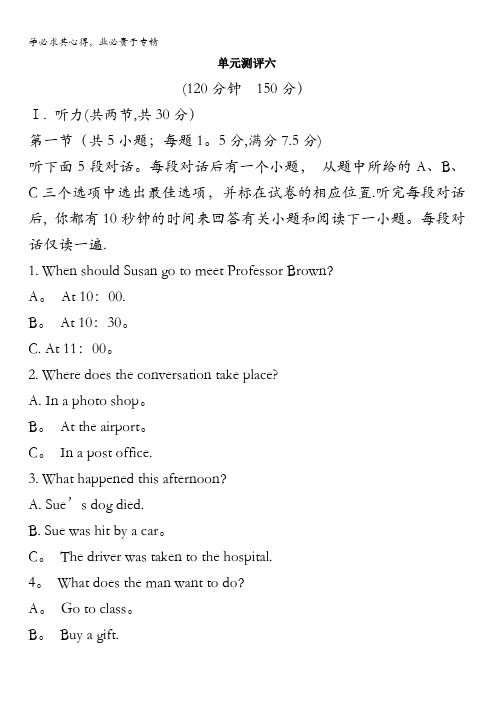
单元测评六(120分钟150分)Ⅰ. 听力(共两节,共30分)第一节(共5小题;每题1。
5分,满分7.5分)听下面5段对话。
每段对话后有一个小题,从题中所给的A、B、C三个选项中选出最佳选项,并标在试卷的相应位置.听完每段对话后, 你都有10秒钟的时间来回答有关小题和阅读下一小题。
每段对话仅读一遍.1. When should Susan go to meet Professor Brown?A。
At 10:00.B。
At 10:30。
C. At 11:00。
2. Where does the conversation take place?A. In a photo shop。
B。
At the airport。
C。
In a post office.3. What happened this afternoon?A. Sue’s dog died.B. Sue was hit by a car。
C。
The driver was taken to the hospital.4。
What does the man want to do?A。
Go to class。
B。
Buy a gift.C. Ask the way.5. What are they talking about?A. Seasons。
B。
Temperature.C。
Weather。
第二节(共15小题;每小题1。
5分;满分22. 5分)听下面6段对话或独白.每段对话或独白后有几个小题,从题中所给的A、B、C三个选项中选出最佳选项, 听每段对话或独白前, 你将有5秒钟的时间阅读各个小题;听完后,每小题将给出5秒钟的作答时间。
每段对话或独白读两遍.听第6段材料,回答第6~7题。
6。
Why did the man get a new TV?A。
He loved big televisions。
B. His old TV didn’t work well.C。
高二英语外研版选修六-Module-6-整个单元教案
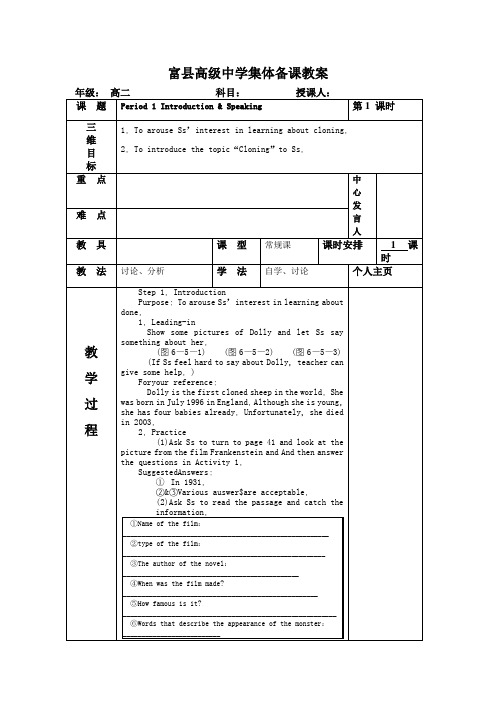
富县高级中学集体备课教案
附注:课型填“常规课”或“复习课”或“习题课”或“多媒体课”。
富县高级中学集体备课教案
附注:课型填“常规课”或“复习课”或“习题课”或“多媒体课”。
富县高级中学集体备课教案
附注:课型填“常规课”或“复习课”或“习题课”或“多媒体课”。
富县高级中学集体备课教案
附注:课型填“常规课”或“复习课”或“习题课”或“多媒体课”。
富县高级中学集体备课教案
附注:课型填“常规课”或“复习课”或“习题课”或“多媒体课”。
富县高级中学集体备课教案
附注:课型填“常规课”或“复习课”或“习题课”或“多媒体课”。
(完整版)外研版高中英语选修六Module6
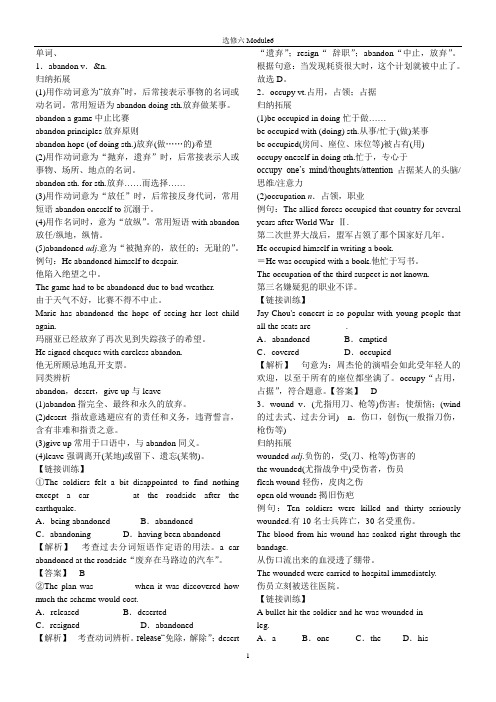
单词、1.abandon v.&n.归纳拓展(1)用作动词意为“放弃”时,后常接表示事物的名词或动名词。
常用短语为abandon doing sth.放弃做某事。
abandon a game中止比赛abandon principles放弃原则abandon hope (of doing sth.)放弃(做……的)希望(2)用作动词意为“抛弃,遗弃”时,后常接表示人或事物、场所、地点的名词。
abandon sth. for sth.放弃……而选择……(3)用作动词意为“放任”时,后常接反身代词,常用短语abandon oneself to沉溺于。
(4)用作名词时,意为“放纵”。
常用短语with abandon 放任/纵地,纵情。
(5)abandoned adj.意为“被抛弃的,放任的;无耻的”。
例句:He abandoned himself to despair.他陷入绝望之中。
The game had to be abandoned due to bad weather.由于天气不好,比赛不得不中止。
Marie has abandoned the hope of seeing her lost child again.玛丽亚已经放弃了再次见到失踪孩子的希望。
He signed cheques with careless abandon.他无所顾忌地乱开支票。
同类辨析abandon,desert,give up与leave(1)abandon指完全、最终和永久的放弃。
(2)desert指故意逃避应有的责任和义务,违背誓言,含有非难和指责之意。
(3)give up常用于口语中,与abandon同义。
(4)leave强调离开(某地)或留下、遗忘(某物)。
【链接训练】①The soldiers felt a bit disappointed to find nothing except a car__________at the roadside after the earthquake.A.being abandoned B.abandoned C.abandoning D.having been abandoned【解析】考查过去分词短语作定语的用法。
外研版高二英语选修6_Module2_Reading_and_Vocabulary_课后练习
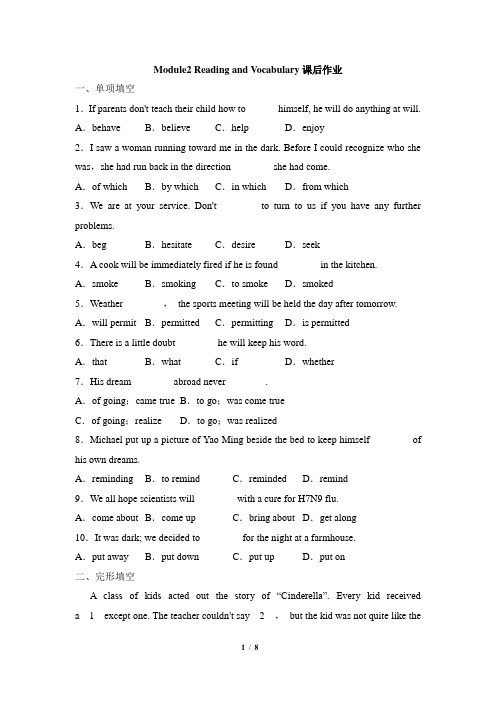
Module2 Reading and Vocabulary课后作业一、单项填空1.If parents don't teach their child how to______ himself, he will do anything at will. A.behave B.believe C.help D.enjoy2.I saw a woman running toward me in the dark. Before I could recognize who she was,she had run back in the direction________ she had come.A.of which B.by which C.in which D.from which3.We are at your service. Don't________ to turn to us if you have any further problems.A.beg B.hesitate C.desire D.seek4.A cook will be immediately fired if he is found________ in the kitchen. A.smoke B.smoking C.to smoke D.smoked5.Weather________,the sports meeting will be held the day after tomorrow. A.will permit B.permitted C.permitting D.is permitted6.There is a little doubt________ he will keep his word.A.that B.what C.if D.whether7.His dream________ abroad never________.A.of going;came true B.to go;was come trueC.of going;realize D.to go;was realized8.Michael put up a picture of Yao Ming beside the bed to keep himself________ of his own dreams.A.reminding B.to remind C.reminded D.remind9.We all hope scientists will________ with a cure for H7N9 flu.A.come about B.come up C.bring about D.get along10.It was dark; we decided to ________for the night at a farmhouse.A.put away B.put down C.put up D.put on二、完形填空A class of kids acted out the story of “Cinderella”. Every kid received a__1__except one. The teacher couldn't say__2__,but the kid was not quite like therest. So she asked, “Norman, what are you going to be?” “I will be a__3__.”“But there's no pig in this story.” And Norman said, “Well, there is one now.”No one knew how to__4__a pig into the story. But Norman knew__5__what his part was. His idea was to__6__Cinderella wherever she went and to do whatever she did. Norman had__7__to say, but his face reflected(表达)the action of the play.__8__things were serious, he was serious. When things looked worrisome, he looked__9__. And at the end of the performance, when Cinderella was carried off to live happily, Norman stood there and barked. The teacher__10__,“Norman, although there is a pig in the story, pigs do not__11__.” And Norman said, “Well, this one does.”Word__12__,and many people called up the teacher and asked what was__13__about it. She said, “Well, there is a pig in it__14__a barking pig.” And the person on the other end of the__15__would say, “But there is no barking pig in Cinderella.” The teacher said, “Well, there is now.”This teacher was Sophia Smith. She herself was a barking pig. She said there should be a college for women,__16__people said there was no such thing before. Her__17__was, “Well, there is now.”I__18__think of the Cinderella story and like it very much, because Norman, the barking pig, got up and__19__that there should be room for him in this world. This is a story which gives us much __20__.1.A. book B.gift C.role D.letter2.A. how B.where C.when D.why3.A. pig B.dog C.student D.waiter4.A. put B.make C.fit D.throw5.A. exactly B.finally C.slowly D.suddenly6.A. play with B.mix with C.go with D.agree with7.A. anything B.everything C.something D.nothing8.A. How B.Why C.Whether D.When9.A. pleased B.excited C.surprised D.worried10.A. cried B.shouted C.laughed D.joked11.A. bark B.cry C.smile D.sing12.A. spread B.failed C.passed D.came13.A. strange B.special C.useful D.important14.A. actually B.almost C.luckily D.probably15.A. street B.telephone C.row D.Internet16.A. and B.but C.or D.for17.A. reply B.ask C.explanation D.reason18.A. never B.seldom C.always D.once19.A. ordered B.requested C.suggested D.said20.A. encouragement B.happinessC.sadness D.experience三、阅读理解There's a new kind of game on the Internet. When you play it, you do more than simply get points or have fun. As you play, you help computers develop new skills. Computer scientist Luis von Ahn created the games as a way to solve problems that are difficult for computers, even though the problems may seem simple to us. Computers, for example, have a hard time identifying a cat in a photo, while we can spot a cat at a glance.The idea is to invent online games that people enjoy playing. Then, as people play, they provide data that researchers can use to improve computers. The players don't know that they're helping out. They're just having fun.“The potentials huge,” says computer scientist Manuel Blum, one of von Ahn's colleagues at Carnegie Mellon University in Pittsburgh. “These games with a purpose make use of humans in a wonderfu l way.”By harnessing the brainpower of thousands of people playing games on the Internet, computers may learn how to identify pictures, translate Web pages into forms that blind people can use, develop common sense, understand foreign languages, and more.Our brains are made to collect and process lots of information about what we see,von Ahn says.Computers, on the other hand, simply “see” a grid of dark and light dots, called pixels. It's not obvious to a machine that a certain blob is a cat. Likewise a computer doesn't know that a tiger, a cartoon feline, and a kitty curled up on a couch all belong in the same category: cat.“If you give me an image of some common animal, I can tell you if it's a cat or a dog,” von Ahn says. “Computers can't do that yet.”Because computers can't make such distinctions, search engines have a hard time finding images on the Internet, and getting people to label each image doesn't work well. There are billions of images, and the job is pretty boring.1.The new kind of game on the Internet created by Luis von Ahn can mainly________.A.help us have fun at any timeB.help the computer spot a catC.help the computer solve problemsD.help us relax by playing it2.People like playing online games because________.A.they enjoy having fun by playing themB.they want to improve their playing skillsC.they want to make money by playing gamesD.they want to solve the problems with computers3.The main difference between our brains and computers is that________.A.we can identify everything while computers can't do it at allB.the computers do what people tell them to, which we can not doC.our brains can collect information while computers can only identify dots D.we can recognize a computer while a computer can not recognize us 4.Computer scientists control the brainpower of people playing games on the Internet to________.A.get personal information to make lots of moneyB.make computers faster and safer than beforeC.ask them to translate Web pages into forms that blind people can use D.get information to solve problems that are difficult for computers5.We can learn from the passage that________.A.people may refuse to play online games when they know what they are for B.more and more online computer games may be createdC.people's brains will become better after they play computer games D.scientists will solve the problems with the help of game players参考答案与解析一、1.A behave oneself守规矩,符合句意。
高中英语外研版选修6学案:Module 2-Section Ⅲ 含解析(精修版)
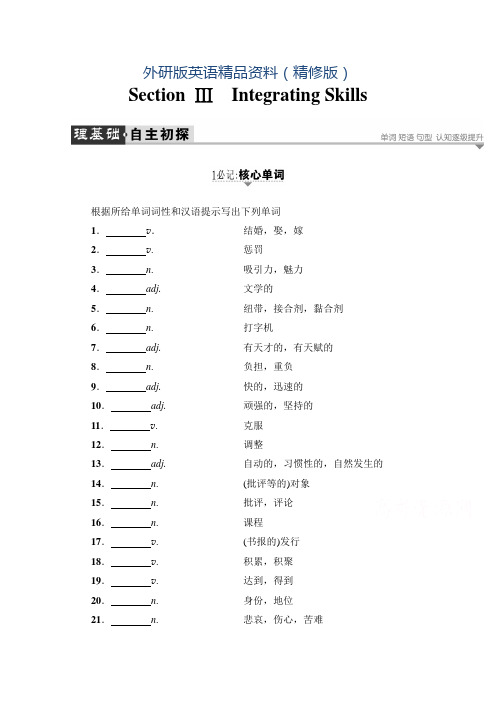
外研版英语精品资料(精修版)Section ⅢIntegrating Skills根据所给单词词性和汉语提示写出下列单词1.v.结婚,娶,嫁2.v. 惩罚3.n. 吸引力,魅力4.adj.文学的5.n. 纽带,接合剂,黏合剂6.n. 打字机7.adj.有天才的,有天赋的8.n. 负担,重负9.adj.快的,迅速的10.adj.顽强的,坚持的11.v. 克服12.n. 调整13.adj.自动的,习惯性的,自然发生的14.n. (批评等的)对象15.n. 批评,评论16.n. 课程17.v. (书报的)发行18.v. 积累,积聚19.v. 达到,得到20.n. 身份,地位21.n. 悲哀,伤心,苦难22.adj.魔法的;不可思议的23.n. 力量,能力24.v. 拥有【答案】 1.marry 2.punish 3.appeal 4.literary 5.bond 6.typewriter 7.gifted8.burden 9.swift10.stubborn11.overcome12.adjustment 13.automatic14.target15.criticism 16.curriculum17.distribute18.accumulate 19.attain20.status21.sorrow22.magical 23.power24.possess根据提示补全下列短语1.(be)associated 与……有联系;与……联系在一起2.appeal sb. 对某人有吸引力,引起某人的兴趣3.(be)restricted 限于4.ahead 在……前面5.look back one's shoulder 回头看6.catch a of 瞥见7.set 出发,动身8.to 应该【答案】 1.with 2.to 3.to 4.of 5.over 6.glimpse7.out8.ought根据提示补全下列教材原句【导学号:38300009】1.,the king immediately falls in love with her.一见到她,国王就爱上了她。
【精品】高中英语外研版选修6 模块综合测评2 含解析

模块综合测评(二)Modules 3~4Ⅰ.阅读理解(共15小题;每小题2分,满分30分)AThe opera house in Santa Fe, New Mexico, is one of the most beautiful opera houses in the United States.It is small and open, with one roof over the stage where singers perform and another roof over part of the audience.This opera house in the mountain is one of the best opera houses in the country, which may seem surprising because performances are only given during seven weeks in the summer, and because Santa Fe is a very small city.One reason why the Santa Fe Opera is so good is that it attracts many excellent young singers.They all hope to sing in famous opera houses like Metropolitan in New York someday, and they work hard to become wellknown during the summer.The musicians and directors are experts who come from the best orchestras (管弦乐队) and operas in the country during their vacations.They enjoy working there because they like to live in Santa Fe, which is near both the mountains and the desert.It is very beautiful there in summer.The state government of New Mexico advertises the Santa Fe Opera in newspapers all over the country, and a great many tourists come to New Mexico because of the opera.Still, most of the audience do come from Santa Fe and other nearby cities,and all the seats in the theater are sold for every show.There is only one thing that some people do not like about the Santa Fe Opera, and that is the cold weather.Because the theater is open, performances cannot start before it gets dark at nine o'clock in the evening, and then the mountain air becomes very cool.Sometimes people complain about the cold air, but because the operas are good, these people come back again wearing warm coats.1.This passage mainly introduces .A.a mountain city B.young musiciansC.an opera house D.the tourists in Santa Fe【解析】主旨大意题。
2019学年高二英语外研版选修6练习:Module 6《War and Peace》Section Ⅱ(含解析)
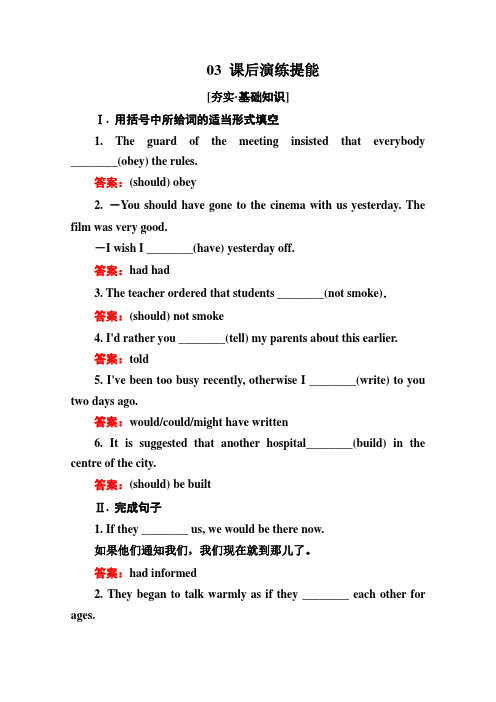
03 课后演练提能[夯实·基础知识]Ⅰ. 用括号中所给词的适当形式填空1. The guard of the meeting insisted that everybody ________(obey) the rules.答案:(should) obey2. -You should have gone to the cinema with us yesterday. The film was very good.-I wish I ________(have) yesterday off.答案:had had3. The teacher ordered that students ________(not smoke).答案:(should) not smoke4. I'd rather you ________(tell) my parents about this earlier.答案:told5. I've been too busy recently, otherwise I ________(write) to you two days ago.答案:would/could/might have written6. It is suggested that another hospital________(build) in the centre of the city.答案:(should) be builtⅡ. 完成句子1. If they ________ us, we would be there now.如果他们通知我们,我们现在就到那儿了。
答案:had informed2. They began to talk warmly as if they ________ each other for ages.他们开始热情地交谈,好像认识很久了。
答案:had known3. ________,we would still be working now.要不是你的帮助,我们现在仍然在工作。
高二英语外研版选修六教学案:Module 2 Section 2 含答案

Ⅰ.单词拼写1.With a wave of his hand, the magician made the rabbit vanish (消失).2.Look out! You could fall off the edge (边缘).3.The soil was washed away by the flood, exposing bare (光秃秃的) rock.4.If you have followed our series (系列) so far, then you know all of this already. 5.We were so tired that we found it difficult to awake (醒着的).6.There's some doubt (怀疑) about his suitability for the job.7.There were balloons of all shapes (形状) and sizes in the sky.8.He patted (轻拍) the girl on the shoulder in an attempt to comfort her.9.Bend (弯曲) your knees, but keep your back straight.10.I never dreamed (做梦) of there being any good chance for me.Ⅱ.拓展词汇1.heroine n.(小说、电影中的)女主角→hero n.(小说、电影中的)男主角2.behave v.表现,举动→behaviour n.举止,行为3.definitely adv.确定地,一定地→definite adj.肯定的;明确的4.hesitate v.犹豫,迟疑→hesitation n.犹豫,迟疑5.exhaustion n.疲惫,精疲力竭→exhaust vt.使筋疲力尽→exhausted adj.筋疲力尽的6.longing n.渴望→long v.渴望7.invisible adj.看不见的→visible adj.看得见的8.roughly adv.大概地,粗略地→rough adj.粗略的;粗糙的9.profoundly adv.深深地,极度地→profound adj.深远的,极度的10.utterly adv.完全地,绝对地→utter adj.完全的;绝对的[巧记单词]Ⅲ.补全短语1.play an important part in 在……中起重要作用,对……有重要影响2.put down 放下3.hold out 伸出4.come up to 朝……走过来5.turn away 走开,打发走,将……拒之门外6.sweep over 向……扩展7.keep one's eyes on 注视,盯着看,注意8.fix on 注视,凝视9.cast about 寻找,搜索,想办法10.(be) laden with (空气中)充溢着(某种味道)的11.look around for 四处寻找1.[教材原句]Then she leapt backwards, back arched and fur on end, tail held out stiffly.然后她向后一跃,脊背拱起,毛发竖起,尾巴僵直地伸着。
外研版高中英语选修6教案

外研版高中英语选修6教案篇一:高二英语外研版选修六Module 6 整个单元教案富县高级中学集体备课教案1附注:课型填“常规课”或“复习课”或“习题课”或“多媒体课”。
2富县高级中学集体备课教案345篇二:高二英语外研版选修6 Module 4教案Module 4MusicContent: IntroductionTeaching aims and teaching demands:1 Have the students know some Chinese and western instruments.2 Have the students know some knowledge about music.3 To train the students’speaking skills and listening skills through making dialogues.4 To train the students how to improve their oral English. Important and difficult points:1 How to master the names of different instruments.2 How to distinguish the Chinese and western instruments.3 How to make the students perform themselves in class and make dialogues with others in English.4 The knowledge of music and development of the students’oral English and the skills of communication. Teaching style: warming-upTeaching methods: elicitation and discussion.Teaching instruments: computer, blackboard, and lantern slide.Teaching procedures:Step I : Lead-in.? Teacher: Thank you for your sing!? Do you like singing in your spare time?? How do you feel when you finish listening to a song or singing a song?? Which subject do we study from how to sing?? Is sing equal to music?Notes: The teacher directs the students to begin this topic through their answers---singing.T: In this module, we will discuss something about music together.Step II: Warming-up..1: T: How much do you know about the world of music? 2: Ss: There are the types of music, composer, band, singers, choir, instruments and so on.3: T: What do the types of music have?4: Ss: pop music, folk music, rock music, classical music, rap music, and jazz music.Step III: The discussion about instruments.1 T: Please discuss the question with other students.①How many of the Chinese instruments and western instruments have you heard?Two minutes!2 Ss: The names of different instruments.3 T: Let’s enjoy beautiful pictures about instruments to know them detailedly.Notes: The teachers first shows different pictures about the instruments and then have the students answer what it is. If some instruments are not known by the students, the teacherwill gives information about them for the students.4 Instruments include: erhu, drum, flute, vertical bamboo flute, piano, electronic organ, saxophone, konghou and harp, guzheng, dulcimer, violin, guitar, cello, lute, pipa, mandolin, and yueqin.StepⅣ: Introduction.1 T: Have the students complete activity 1.Look at the photos of Chinese and western musical instruments and answer the questions.2 Check the answers:①All of them have strings②The pipa and the lute, the konghou and harp③The pipa, lute, yueqin, and mandolin.Notes: When the students answer the questions, the teacher needs to refer to the other instrumentswhich the students enjoyed just now.StepⅤ: Discussion.1 T: Give three questions to the students.?????? (1) How much information do you know about the artists Langlang and Twelve Girls Band? (2) Do you know any Chinese classical music pieces which feature these instruments? Eg; Liangzhu. (3) Which type of music do you like best, and why? Notes: If the students may not know them in detail, they can ask their music teacher or surf the Internet after class. Five minutes. Notes: some information bout Langlang and Twelve Girls Band: Langlang: pianist king , he was born in Shenyang city and began to study piano at the age of 3.He is the first Chinese pianist who played the piano in the White House. On 8th in August in 2008, he played the piano in the 29th Olympics in China. We are all proud of him, because we are all Chinese.? Twelve Girls Band is already one of China’s most popular groups. It is made up of a dozenbeautiful women who are among the most gifted musicians in the world. They perform on traditional Chinese instruments such as the Guzheng, the pipa and so on. Having received classical training, those twelve girls have built a musical bridge between east and west and charmedthe people of many nations around. The group shows a genuine love for all styles of music, which makes them well received all over the world.?????????? 2 Students’performances. Step Ⅵ: Homework. 1 Review the instruments which we knew in this class. 2 Prepare for the reading and vocabulary. Thank you for your cooperation! Best wishes for you ! Have a wonderful time in your life! Happiness will never leave you!篇三:【教材全解】2014-2015学年高中英语外研版选修六教案:M6 Period 6Period 6 Workbook.Task.Module File Teaching Goals:1.To deal with the exercises in the Workbook.2.To enable Ss to make a conclusion of thismodule.Teaching Procedures:Step 1.Revision Purpose:To deal with the exercises in the Workbook.First,check Ss whether they have finished the exercises in the Workbook.And then give some instruction of the exercises.Step 2.TaskPurpose:To help Ss to express their opinions about war.Ask Ss to write down their opinions about war on the blackboard.Step 3.Module FilePurpose:To enable Ss to make a conclusion of this module and to deepen what we have learned in the module.Ask Ss to look at Module File and try to recall what they have learnt.Then tick the things they are sure that they know and put a question mark next to the points they are not sure of and a cross to what they don’t know.Help Ss to share their ideas and deal with the difficult or confusing points.Step 4.Assessment1.Individual work for self-assessmentT:In this module.you have learnt something about War and peace.HowReflectionI learnt_________1 would like to know about _________ I’m still not sureabout __________ I’m confused about________________ 2.Group work- 1 -- 2 -篇四:高二英语外研版选修6 module 1 small talk教案Module1 Small TalkWords and expressions1. lack v 缺乏,没有The problem is which companies lack the latest equipment. They sitill lack experience\ confidence.lack n 缺乏,不足There has been a great lack of water in this summer. There is a lack of modern equipment here; I shall have to go to Guangzhou to briing some in.Phrases:lacking adj 缺乏的,不足的be lacking in 缺少----,没有----for\ through lack of 因缺乏---2. advanceadj 预先的,在前的,事先的Please give us advance warning of any changes to the schedule.vtadvance a suggestion 提出,建议advance prices 提高(价格),提升(某人)The teacher has done his best to ~the students’interest in English.(促进)The date of the meeting was advanced by 4 days.(将----提前)vi 前进;取得进展;被提升;物价等上涨,增加~ agains\ on\ upon the enemy 向敌人前进~ in skills 在技巧方面取得提高He advanced rapidly in his job.使升迁,被晋升~ in ages 年岁大起来n.they have made great advances. 进步Nothing could stop the advance of the soldiers.前进I was given an advance of a month’s pay. 预付advanced adj 高级的,先进的,高等的in advance 预先,事先pay in advancein advance of 在-----前面,超前3. think of想起,回想起We often think of you.This made us think of our days in the army.考虑,认为(think of sb\sth ------ as sth)They’re thinking of\ about buying a new car.What do you think of\ about the film?phrases.think about思索考虑think out仔细考虑盘算think over 仔细考虑think to oneself 心中想think up想出,发明think twice 再三考虑So far this is the best way I’ve thought of ________ this problem. (to settle)4. look away (from) 把目光从------移开,把脸转过去She looked away in embarrassment.The sunlight on the water was so dazzling that people had to look away.phraseslook intolook after look down upoon look throughlook up look out5. in addition 此外,并且;做副词使用,其后不接其他成分in additon to 除了---之外(还)做介词使用,后接名词或代词做宾语My mother gave me sandwiches for my lunch and a bag of milk in addition.In addition to English, he has studied a second foreign language.6. find out了解,认识到We became so interested in her story that we decided to find out more about her.We should find out what the masses think .找出,查明,弄清楚I must ring them up and find out if Xiao Wu is there.They have to find out how to bring about improvement. 7. opportunity 机会,良机make an (the) opportunity of doing (或to do) 创造做某事的机会at \ on the first ~ 一有机会就---have little(no, not much, an ) 很少有,没有,有不多的,有机会做某事in search of new opportunities 寻求新的机会I take this opportunity oof thanking you.8. applicationn.申请,申请书,请求They accepted my application to join the club.Please complete this job application form carefully.应用,运用,涂抹,敷用The application of new scientific discoveries to industrial production usually improves efficiency. 把新的科学发现运用到工业生产当中,通常可以提高效率。
高中英语外研版选修6学案:1-section ⅱ 含解析
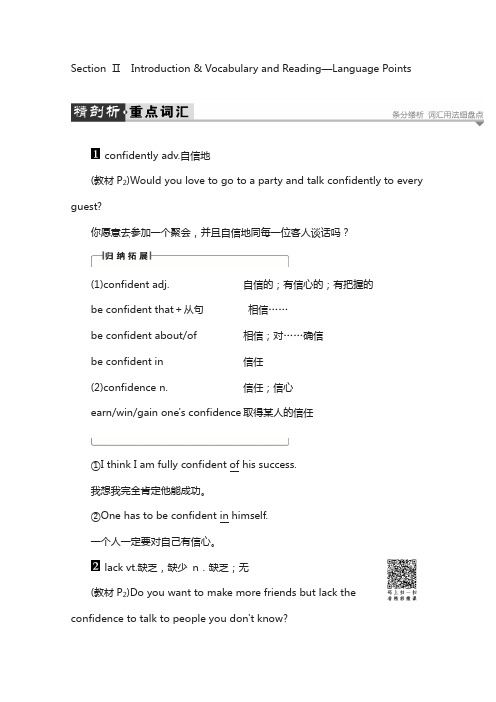
Section ⅡIntroduction & Vocabulary and Reading—Language Pointsconfidently adv.自信地(教材P2)Would you love to go to a party and talk confidently to every guest?你愿意去参加一个聚会,并且自信地同每一位客人谈话吗?(1)confident adj. 自信的;有信心的;有把握的be confident that+从句相信……be confident about/of 相信;对……确信be confident in 信任(2)confidence n. 信任;信心earn/win/gain one's confidence 取得某人的信任①I think I am fully confident of his success.我想我完全肯定他能成功。
②One has to be confident in himself.一个人一定要对自己有信心。
lack vt.缺乏,缺少n.缺乏;无(教材P2)Do you want to make more friends but lack theconfidence to talk to people you don't know?你愿意多交朋友但又缺乏同陌生人交流的自信吗?(1)lack sth. 缺乏某物lack for money/nothing 缺钱/什么都不缺(2)lack n. 缺少,缺乏the/a lack of... ……不足for lack of 因缺乏……(3)lacking adj. 缺少的,缺乏的be lacking in 缺乏;没有①Lack of money is the root of all evil.缺乏金钱是万恶之源。
②He is lacking in responsibility.他缺乏责任心。
外研版高中英语选修六Moudle6Part2

高中英语学习材料(灿若寒星*制作整理)CHECKING CORNER Part 2GRAMMARI. 根据括号内的汉语提示,完成下列句子。
1. If they ________ (通知) us, we would be there now.2. They began to talk warmly as if they ________ (认识) each other for ages.3. ________ (要不是你的帮助), we would still be working now.4. The teacher advised that we ________ (充分利用) every minute to study.5. It is time that I ________ (去接) my daughter at school.6. It is important that children ________ (学习) to get on with each other.II. 从A、B、C、D四个选项中,选出可以填入空白处的最佳选项。
1. I learned something about you yesterday, otherwise I _____ then.A. wouldn’t have guessedB. didn’t guessC. hadn’t guessedD. wouldn’t guess2. Jim’s father suggested that he _____ his homework before watching TV.A. finishedB. finishC. would finishD. has finished3. If only she _____ quietly as the doctor instructed, she would not be suffering so much now.A. liesB. layC. had lainD. should lie4. They required that the Science Museum _____ open on weekends.A. keptB. was keptC. be keptD. must be kept5. It was strongly recommended that he _____ a holiday to reduce his stress.A. had takenB. takesC. takeD. could take参考答案I. 1. had informed 2. had known3. But for your help4. (should) make good use of5. went to pick up6. (should) learnII. 1-5 ABCCC Common Progress Please Criticize。
- 1、下载文档前请自行甄别文档内容的完整性,平台不提供额外的编辑、内容补充、找答案等附加服务。
- 2、"仅部分预览"的文档,不可在线预览部分如存在完整性等问题,可反馈申请退款(可完整预览的文档不适用该条件!)。
- 3、如文档侵犯您的权益,请联系客服反馈,我们会尽快为您处理(人工客服工作时间:9:00-18:30)。
外研版英语精品资料(精修版)Ⅰ.单词拼写1.I'd like to book a room in your hotel, in which I can overlook (俯视) the sea from the window.2.The camp lasted (持续) for only a week, but some teachers noticed great changes in their students after the activity.3.Japan used to occupy (占领) Taiwan for as long as 50 years.4.The brave soldier dived into the water and rescued (营救) the drowning boy, which made us very moved.5.I returned to the village many times, and eventually (最终) I gained their trust. 6.The wounded (受伤的) soldier should be sent to the hospital in no time.7.A group of soldiers led by their commander (指挥官) were advancing towards the front. 8.Because of the icy road, he had to abandon (抛弃) his car and walk home.Ⅱ.拓展词汇1.invade v.入侵,侵略→invasion n.侵入,侵略2.abandon v.放弃,抛弃→abandoned adj.自甘堕落的,被抛弃的,无约束的3.operation n.行动;操作;经营;手术→operate v.操作;运转;做手术4.survivor n.幸存者→survive vi.幸存,比……活得长→survival n.幸存,生存5.occupy v.占领→occupation n.职业→occupational adj.职业的6.commander n.指挥官→command v. & n.命令,指挥7.deep adj.深的→deeply adv.深深地,深刻地→depth n.深度8. shocked adj.感到震惊的;惊愕的→shock v.使震惊n.震惊,惊愕[巧记单词]Ⅲ.补全短语1. at the same time 同时2.take place 发生3. at one point 一度,在某一时刻4.declare war on 对……宣战5.take part in 参加6.get off 下车/船/飞机7.make a breakthrough 取得重大突破(进展)8.pick up 停下来让某人搭车(船等);救起9.as a result 结果,因此10.be situated on 位于,坐落在1.[教材原句]The operation was extremely dangerous and many soldiers were killed before they even got off the boats.这次登陆行动异常危险,很多士兵还没来得及下船就牺牲了。
[句型点拨]before引导的时间状语从句。
[佳句赏析]我还没来得及跟他解释任何事情,他就生气地离开了。
He had left angrily before I could explain anything to him.2.[教材原句]The survivors lay on the beach, exhausted and shocked.死里逃生的战士们躺在沙滩上,疲惫不堪,心有余悸。
[句型点拨]形容词短语作状语。
[佳句赏析]干了一天的重活,那位工人回到家,又累又饿。
After a whole day's heavy work, the old worker returned home, tired and hungry. 3.[教材原句]After an hour and fortyfive minutes, six of the survivors tried to climbup the cliff to get off the beach. Four were too exhausted to reach the top.一小时四十五分钟后,六位幸存的战士试图爬上悬崖以离开海滩。
其中四名战士由于筋疲力尽未能攀上顶端。
[句型点拨]too ... to ...“太……而不能……”。
[佳句赏析]站在校长面前,这个男孩太害怕了而说不出话来。
Standing before the headmaster, the boy was too frightened to speak.1.In September 1939, Britain declared war on Germany after Germany invaded Poland.(P72) 1939年9月,英国在德国入侵波兰后向德国宣战。
★declare war on向……宣战(1)declare for/against 宣布赞成/反对declare sb. to be 宣布某人为……declare ... open 宣布……开幕declare oneself 发表意见;表明身份(2)declaration n. 宣告,宣布,公告①The country had no choice but to declare war on their enemy.这个国家别无选择,不得不向他们的敌人宣战。
②Our government declared against this plan.我们的政府声明反对这项计划。
③He declared himself to be a secret agent.他公开了自己是一个秘密间谍的身份。
[易混辨析]选用上述词语填空④They announced that they would get married on October 1.⑤The use of certain chemicals has now been declared illegal.2.During the war, Germany occupied many countries, including France.(P72)二战中,德国侵占了包括法国在内的许多国家。
★occupy v.占领,占据(时间、空间、某人头脑等);使忙碌①The big table occupies too much room.这张大桌子占了太多空间。
(1)occupy oneself with/in ... 忙于……;专心于……occupy one's mind/thought/attention 占据某人的头脑/思维/注意力(2)occupied adj. 已占用的;无空闲的;在使用的be occupied with/in ... 忙于……;专心于……keep sb. occupied with sth./(in) doing sth.使某人忙碌于(做)某事(3)occupation n. 占领;职业②Occupy yourself with/Keep yourself occupied with something interesting and you will not feel bored.忙于一些有趣的事情,你就不会厌烦了。
③Occupied with her children, Mrs White can't go shopping with us.因为忙于照顾孩子,怀特夫人不能和我们一起去购物。
④She occupied her mind with pleasant thoughts of the vacation.她沉浸在对假期的美好想象之中。
3.The operation was extremely dangerous and many soldiers were killed before they even got off the boats.(P72)这次登陆行动异常危险,很多士兵还没来得及下船就牺牲了。
★before引导的时间状语从句,在此句中before意为“还没来得及……就……”。
①He rang off before I could explain.我还没来得及解释,他就挂电话了。
it was+时间段+before ... 多长时间后就/才……it will be+时间段+before ... 多长时间后就/才……it was not long before ... 不久就……it will not be long before ... 不久就会……②It was three days before he came back.过了三天他才回来。
③It will not be long before we get used to the new school life.不久我们就会习惯新的学校生活。
4.The situation at Omaha Beach was so bad that the US army commanders thought about abandoning the invasion.(P72)奥马哈海滩的形势非常严峻,以至于美军司令官都考虑放弃进攻了。
★abandon v.放弃,抛弃,中止,陷入,沉湎于 n.放任,放纵①They had to abandon the match because of rain.因为下雨,他们不得不中止了比赛。
②We should not abandon a friend who is in danger.我们不应该抛弃处于危险之中的朋友。
(1) abandon (doing) sth. 放弃(做)某事abandon oneself to ... 沉溺于……,放纵……abandon one's post/hope/plan/idea放弃职位/希望/计划/主意with abandon 放纵地;尽情地(2)abandoned adj. 被抛弃了的;废弃的;放纵的③Mother often warns me not to abandon myself to playing(play) computer games.妈妈经常警告我不要沉迷于玩电脑游戏。
